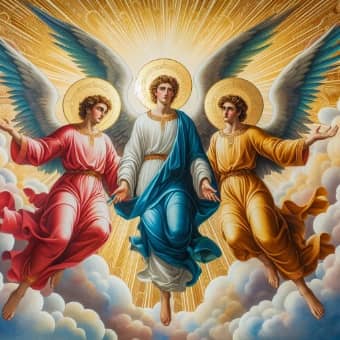The Role of Angels In Catholic Teachings
Exploring the Celestial Hierarchy
Angels hold a significant place in Catholic teachings, serving not just as messengers of God but as protectors, guides, and executors of God’s will. This profound role resonates through numerous scriptures and theological interpretations that shed light on their divine duties and celestial nature.
Here, we delve into the multifaceted roles of angels in Catholicism, exploring their nature, classifications, and importance in the spiritual life of believers.
This blog post contains affiliate links. When you click on a link on this page and make a purchase I may earn a small commission, at no additional cost to you. Thank you for your support.
Understanding the Nature of Angels
According to Catholic doctrine, angels are purely spiritual beings, created by God with intellect and will but without physical bodies. They are immortal and are often depicted as beings of light who serve as God’s messengers.
The Catechism of the Catholic Church clarifies that angels “have been present since creation and throughout the history of salvation, announcing this salvation from afar or near and serving the accomplishment of the divine plan.”

Roles and Responsibilities
Messengers of God’s Word
One of the most well-known roles of angels is as messengers of God. Scriptural examples include the Annunciation, where the Archangel Gabriel announced to the Virgin Mary that she would conceive and become the mother of Jesus Christ (Luke 1:26-38). This pivotal role highlights their integral part in the unfolding of God’s salvific plan.
Archangel Gabriel necklace for men and women
Protectors and Guides
Angels also serve as protectors and guides for humanity. Each believer is thought to have a guardian angel, a concept supported by Jesus’ words in Matthew 18:10, suggesting that angels watch over individuals, guiding and protecting them throughout their lives. These guardian angels help avert spiritual and physical harm and inspire and encourage good thoughts.
St. Michael the Archangel: The ultimate protector, often invoked for defense against evil.
St. Michael the Archangel necklace for men
Archangel Raphael: The archangel of healing and divine mercy.
Saint Raphael the Archangel necklace for men
St. Uriel: The archangel of wisdom and divine illumination.
Saint Uriel the Archangel necklace
Warriors of God
Angels are also seen as warriors of God, fighting evil and defending the righteous. The Book of Revelation describes scenes where angels battle dragons and demons, representing the spiritual warfare that they engage in on behalf of humanity and the maintenance of cosmic order.
Discover the Power of St. Michael: A Guide to Devotion
Unveil the inspiring life and legacy of St. Michael the Archangel with this captivating book. Delve into the rich history of this beloved saint, exploring his role as protector and defender of the faith. Immerse yourself in heartfelt prayers and devotions designed to deepen your connection with St. Michael’s powerful intercession.
Whether you’re a lifelong devotee or seeking to learn more about this extraordinary figure, this book offers profound insights and spiritual nourishment.
Invoke the protection of St. Michael in your life. Order your copy of The Life and Prayers of Saint Michael the Archangel today and embark on a journey of faith and devotion.
Thank you for helping to support this blog by clicking on my Amazon affiliate links.
The Celestial Hierarchy
Catholic tradition, drawing on early Christian theologians like St. Thomas Aquinas and pseudo-Dionysius the Areopagite, speaks of angels as organized in a hierarchy of nine choirs divided into three orders:
Seraphim, Cherubim, and Thrones – These angels are closest to God, focusing on divine worship and perpetuating God’s justice.
Dominions, Virtues, and Powers – These focus on fulfilling God’s orders and empowering the universe’s laws.
Principalities, Archangels, and Angels – These execute God’s decisions, deliver his messages, and watch over nations and individuals.
Angels in the Liturgical Life
Angels are venerated in the liturgical life of the Church through feasts such as the Feast of the Archangels on September 29th and the Feast of the Guardian Angels on October 2nd. These feasts not only honor the angels but also remind the faithful of the angelic presence and assistance in their daily lives.
Conclusion
In Catholicism, angels are more than just heavenly messengers; they are an integral part of God’s providence, guiding and protecting humanity, participating in God’s divine liturgy, and battling against the forces of evil.
Their omnipresent, unseen work is a source of comfort and inspiration for believers, offering a deeper understanding of the spiritual dynamics that influence both heaven and earth. Thus, understanding the role of angels enhances the faith experience, linking the human and the divine in profound spiritual companionship.
Looking for unique Catholic gifts? Check out our gift guide!
